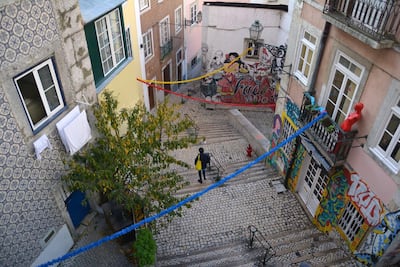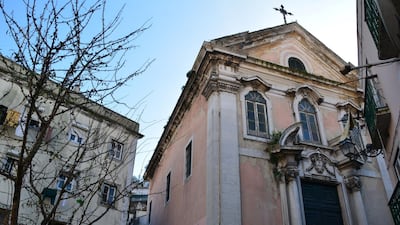Mouraria, a trendy neighbourhood in Lisbon's city centre, still bears the name of its former inhabitants, the Moors – Muslims who lived in the Iberian Peninsula in modern Spain and Portugal, and once walked its maze of narrow and winding streets and tightly packed alleys. Next to Mouraria stands Alfama – from the Arabic word Al hamma, meaning "hot springs" – a neighbourhood that centuries ago gave shelter to the city's large Jewish community.
The Muslim and Jewish areas were once spread from the imposing historical castle that crowns one of Lisbon’s highest hills to the Tagus River, but today only the Moorish names remain. Synagogues and mosques were destroyed or converted into churches when both religious minorities were expelled from Portugal in the late 15th century.
To atone for the religious persecutions, in 2015, the Portuguese government passed a law that allows descendants of those expelled to seek citizenship. Redress, however, was only offered to the Jewish community. Descendants of Muslims were not included in the law.
"The expulsion of Muslims is more related to conquests and battles than religious intolerance," Jose Ribeiro e Castro, a conservative policymaker who drafted the restitution law, tells The National.
In 711, North African Muslims captured the Iberian Peninsula and ruled the territory for centuries. Known as Al Andalus, the region became a prosperous cultural centre where science and the arts thrived, and different religions coexisted. But the strength of Muslim rule diminished over time as Christian armies started conquering the territory.
Aided by crusaders, Catholic kings gradually pushed the Moors to the south, until they were able to capture southern provinces in 1249, ending Muslim rule in the Portuguese territory. While many Muslims fled, a minority were allowed to stay in "mourarias", segregated neighbourhoods for Muslims spread across various cities.
In 1496, Portuguese king Manuel I decided to put an end to the religious coexistence inherited from Al Andalus. Jews and Muslims were only given three stark options: convert to Christianity; leave the kingdom; or face the death penalty.
Portuguese policymakers who drafted the law say the experiences of Jews and Muslims cannot be compared because the expulsion of Jews was purely based on bigotry. But not everyone buys into the argument that the banishment of Muslims was a result of an ongoing conflict.
“The Muslim communities in Portugal were fairly well integrated,” says Francois Soyer, a historian of medieval Europe who researched the evictions. “They were not seen by the Portuguese crown as a threat. It’s very different from what happened in Spain,” he says.

The last Moorish king was defeated in the south of Portugal in the 13th century, nearly 250 years before the Muslim minority was expelled by the Portuguese monarch. Muslims would continue to rule the southern province of Spain for another two centuries until the fall of Granada in 1492.
At the heart of the debate is the question of national identity and construction of Muslims as the "other", against which Europe would define itself. Known as "The Reconquista", the period of Christian expansion and consolidation of power in the Iberian Peninsula played a central role in the establishment of Portuguese and Spanish national identities, in opposition to the Moors.
But according to historian Fatima Barros, a specialist in Portugal’s Muslim minority, there is no reason to see North African rulers as more foreign than the Christian kings coming from Northern Europe, or any other rulers who conquered the territory.
Barros explains that by the 10th century, most of the local population had converted to Islam. “Muslims were not foreigners. They were part of our history and our identity. The Muslim community has been completely forgotten. It is an injustice of history to deny this part of our past.”
In 2018, the Grand Sheikh of Al Azhar said that access to Portuguese citizenship granted to descendants of Jews should also be extended to Muslims who were expelled. “Muslim families from that time also have the right to appeal to entities and claim their rights,” he told the Portuguese media.
Spain passed a similar law offering citizenship to descendants of Jews in 2015 and received 127,000 requests. Portugal has received about 35,000 and, since no deadline was imposed, applications are still open.
“If the law exists then it should be for all the descendants of people who were expelled around that time,” says Fatma Sahli, a Tunisian student who believes her family has roots in Portugal.
"In our region in Bizerte, there are a lot of people with Iberian last names," she tells The National. "Towns were built to accommodate Muslim refugees who were expelled." Sahli says that Andalusian heritage is also still present in the region's architecture, food and customs.
But there are not many documents to prove these connections. The story of the Sahli family’s Iberian origins has been passed on from generation to generation, but there are no records to demonstrate their ancestry.
“I suspect the archives might have been destroyed in wars and takeovers,” says historian Soyer. “The Muslim Iberian exiles assimilated quickly with the Muslim population, so there might be family stories but not documentation.”
Among Jewish communities, on the contrary, documents are abundant. Memory, too, has been so carefully kept alive that, Michael Rothwell, a spokesman for the Jewish community in Portugal, says some of those families still speak Ladino, Medieval Spanish mixed with Hebrew and Portuguese words. For Rothwell, the citizenship law should not be for all descendants, but only for those who have maintained this memory. “What is reasonable is to give nationality to those who not only can prove their descent, but also have kept traces of their Portuguese identity,” he says.
Rothwell says there are also other reasons why descendants of Jews should be treated differently. “Moors had places to go to, there were many Muslim countries that could welcome them, but Jews had nowhere to go,” he says.
To coerce Jews into converting, their children were taken from them and given to Christian families. The remaining Jews were then forcibly baptised, and some committed suicide. “It was easy to harm the Jews because there was no fear of retaliation,” says Rothwell. Historians suggest Muslims might have been allowed to leave Portugal with their families and assets because the country’s king feared retaliation from Islamic states, while Jews were treated more harshly because they had no protection.
But excluded from any form of restitution, Muslims and some experts have accused the Spanish and Portuguese governments of double standards. “I believe the exclusion of Muslims is discriminatory,” says Sahli.
Many believe the way that Muslims are excluded regardless of whether or not they can prove their links to the Iberian Peninsula might be tied to Islamophobia and that there is far less enthusiasm when it comes to encouraging North African Muslims to come to Europe. “The only reason I can see,” says Soyer, “is prejudice.”

